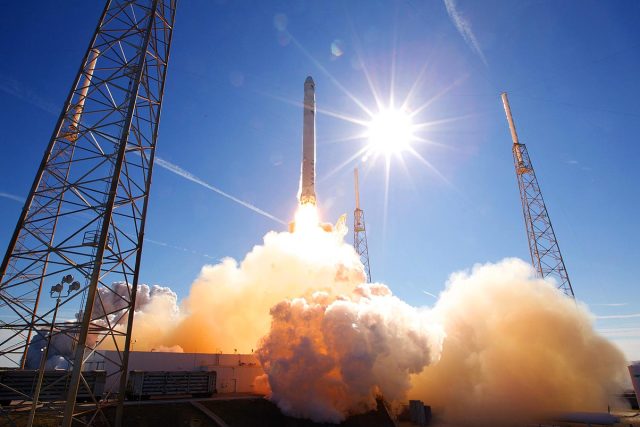
SpaceX's Falcon 9 launch system has been certified by US Air Force for future national security missions, breaking the monopoly currently held by the United Launch Alliance (a joint venture operated by Boeing and Lockheed). SpaceX will now be allowed to compete for very lucrative launch contracts for military and reconnaissance satellites.
“This is a very important milestone for the Air Force and the Department of Defense,” said Deborah Lee James, head of the US Air Force. “SpaceX’s emergence as a viable commercial launch provider provides the opportunity to compete launch services for the first time in almost a decade. Ultimately, leveraging of the commercial space market drives down cost to the American taxpayer and improves our military’s resiliency.”
The certification process began back in December 2014, after SpaceX agreed to drop a lawsuit against the USAF over the beefy $11 billion contract awarded to the ULA for future Evolved Expendable Launch Vehicle (EELV) launches. According to the USAF, it sunk $60 million and 150 people into the certification process, which involved "125 certification criteria, including more than 2,800 discrete tasks, 3 certification flight demonstrations, verifying 160 payload interface requirements, 21 major subsystem reviews and 700 audits." Part of the Falcon 9 certification was "establishing a baseline" for future space launch systems that want to compete for contracts under the EELV program.
With Falcon 9 now certified, the United Launch Alliance finally has some competition. Since the inception of the EELV, there has only ever been two certified space launch systems: Delta IV and Atlas V. At the time, these rockets were built and operated by different companies, but in 2006 they were both moved under the umbrella of the ULA, a joint venture between Boeing and Lockheed.
As you can imagine, it was not overly healthy to have the US Air Force completely beholden to a single entity for its rocketry requirements: It's not good for resiliency, and it's not good for the purse strings either. SpaceX previously claimed that ULA launches were costing the US government $460 million per launch, and that it could instead offer launches for around $100 million. ULA contested that figure, saying the current launch price is actually $225 million, with a plan to bring that price down to around $100 million as well. Whatever the real figures are, it's clear that Falcon 9's certification will increase competition and drive down prices.
With its newfangled certification, the first contract that SpaceX will be able to compete for is the launch of the next-generation GPS III satellites; the request for proposal will be released in June, with the first satellite launch not expected before 2017.
With the EELV program estimated to cost around $70 billion through 2030, there's a lot of money potentially on the table for SpaceX. It would appear to be a very good time for SpaceX to hit its stride and be at the forefront of commercial space travel.
reader comments
59